Behind the surge in sales of new energy vehicles: complaints about the increase in the sale of 8 vehicles and the recall of 1 vehicle
BEIJING, March 16 (Zhang Xu) In 2018, China’s automobile sales declined for the first time in 28 years, but the sales of new energy vehicles increased by 61.7%, making it a bright spot in the automobile market. As a result, the problems of new energy vehicles being complained by consumers are also increasing.
Recently, the China Consumers Association released the "Analysis of Complaints about Automobile Products Accepted by the National Consumers Association in 2018", showing that BYD, German luxury car brands Mercedes-Benz, BMW and Audi were all on the list, and there were also many complaints about battery life and failures of new energy vehicles.
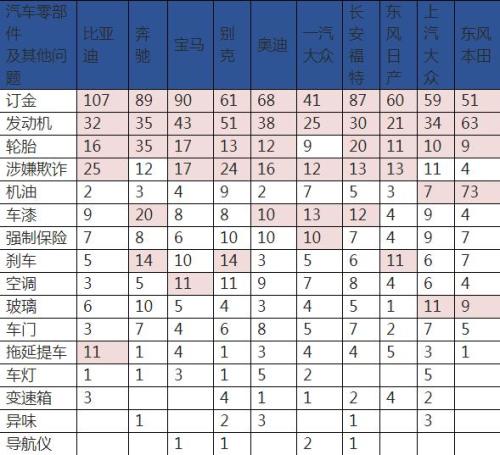
BYD ranks first in the complaint list.
As the first in this complaint list, BYD’s cumulative number of complaints in 2018 was 649, which was much higher than the 550 in the second place. Among the complaints involving BYD, the top five are deposit, engine and suspected fraud. Among them, the number of deposit problems is higher than that of other brands in the top ten.
"I haven’t mentioned the car at the end of the year, and I am worried that the indicators will be invalid." On the BYD-Yuan New Energy Forum of a car website, some netizens complained.
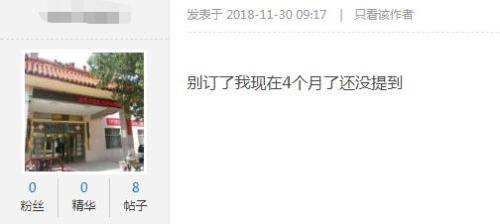
Regarding the complaints, BYD insiders responded to the media, "Last year, new energy vehicles were too hot, the car picking cycle was too long, and customers complained a lot."
Hao Qingfeng, deputy secretary of China Consumer Protection Law Research Association, believes that BYD’s output can’t keep up with the order volume, which is one reason for the increase in complaints.
He pointed out that "the actual performance of new energy vehicles may be different from consumers’ expectations in terms of batteries, cruising range and body quality, so consumers complain more."
Batteries and battery life have become the hardest hit areas.
With the increase in sales of new energy vehicles, some new energy vehicles produced by some car companies have also exposed problems such as substandard cruising range, electric drive control system failure, power battery loss and so on.
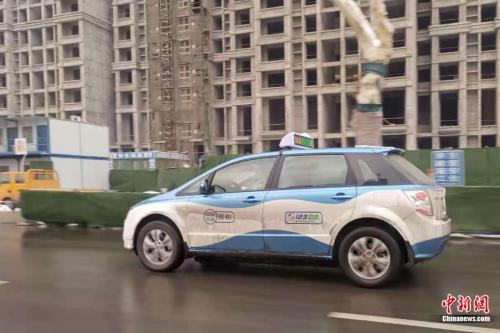
A BYD-Qin car owner initiated a complaint on the car quality network: the factory battery is marked to be rechargeable at 13 degrees, and it can travel 70 kilometers with pure electricity. In 2016, it can only travel 50 kilometers, and in 2017, it will travel about 40 kilometers. At present, it is less than 30 kilometers, and 55% of the power starts to be severely powered off.
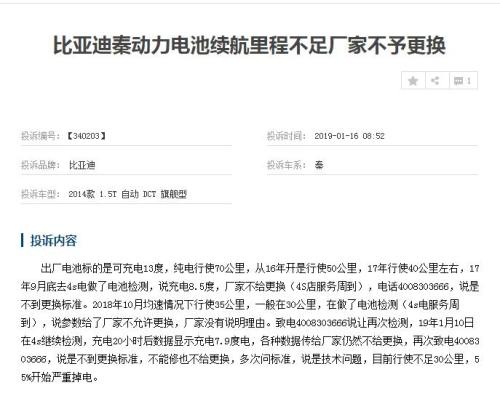
It is worth noting that apart from batteries, there are many factors that affect the driving range, and car companies generally mark them with theoretical values. For example, the slogan of JAC iEVA50 official website is "Worry-free cruising range, excellent cruising range of 500 kilometers", but in fact, 500 kilometers is the maximum cruising range under constant-speed cruising, and its cruising range under NEDC (New European Cycle Test) test is 400 kilometers.
According to media reports, drip drivers in Baoding, Hebei Province have collectively complained that the winter cruising range of the Great Wall C30EV model is seriously below the standard. According to the model data of the Great Wall New Energy C30EV, its comprehensive working range is 270 kilometers, but the actual operating mileage in winter is about 120 kilometers.
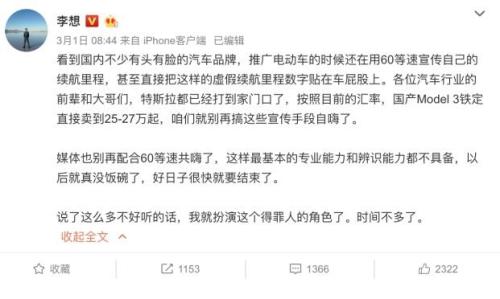
On March 1st, Li Xiang, CEO of Chehejia, issued a document against car companies promoting cruising range at a constant speed of 60 kilometers per hour.
Luo Lei, Deputy Secretary-General of china automobile dealers association, also called for the relevant departments to formulate the test standard of cruising range in a relatively short time, so as to make the market develop healthily.
One in eight new energy vehicles was recalled.
In addition to being complained, recalls of new energy vehicles also occur constantly.
According to the information released by the State Administration of Market Supervision, from January to December 2018, a total of nine new energy passenger cars issued recall announcements, including Tengshi, Lifan, Zotye, Land Rover, BMW Brilliance, Beiqi New Energy, Jianghuai Automobile, Chery and Tesla.
In 2018, China sold 1.008 million new energy passenger cars and recalled 135,700. It is equivalent to one out of every eight new energy vehicles sold.
Among them, Beiqi New Energy ranked first in the recall list with 69,000 vehicles, accounting for 51.1% of the total recall of new energy vehicles in 2018. The reason for the recall of BAIC New Energy is the failure of the vehicle brake booster vacuum pump. During the use of the vehicle, the brake booster performance will be insufficient, or even the brake vacuum booster function will be lost, which has potential safety hazards.
The second place in the recall list is Zotye New Energy Vehicle. Zotye Automobile sold 33,872 vehicles in 2018 and recalled 31,338 vehicles, with a recall ratio of 92.5%. The main reasons for its recall are: the installation problem of the half shaft, the mismatch of the original brake parts, etc.
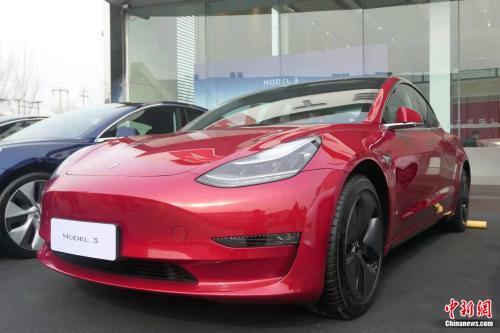
Even Tesla, which is regarded as the benchmark of electric vehicles, has not been spared. In 2018, Tesla recalled 8,898 vehicles in China. The main reason for the recall was that the aluminum bolts on the steering housing had potential safety hazards of corrosion and fracture.
In 2019, the problems of new energy vehicles are still frequent. In the first two months, there have been four recalls of electric vehicles in China, with a cumulative recall of 23,458 vehicles.
"Because new energy vehicles are an immature industry, the products cannot be perfect and need to be constantly improved in practice. With the increase of sales volume, the increase of complaints is a positive correlation and can be understood. The key is how to solve these problems, which requires the attention of enterprises. " Hao Qingfeng said.